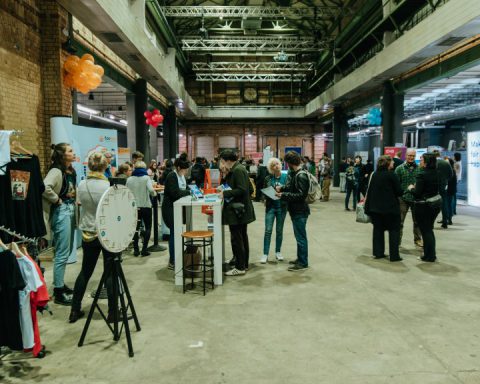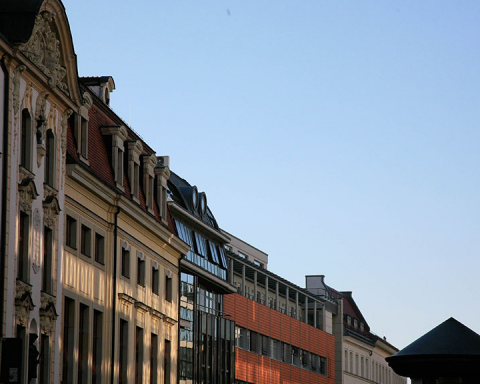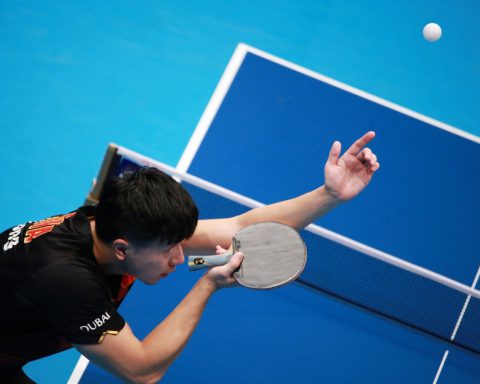For 17 years, Leipzig has hosted a Wasserfest weekend celebrating its canals, rivers and waterways. The most recent event, earlier this month, boasted 100,000 visitors over three days.
The busiest day of the Leipziger Wasserfest was Saturday, 19 August, a highlight being the races of the Deutscher Ruderverband (German Rowing Association, or DRV). Some 20,000 spectators came to watch the races, which lasted from early afternoon until after dark, concluding with fireworks.
The DRV had started a new Bundesliga team competition in 2008, and selected Leipzig as one of its five racing sites – a decision they’re quite happy about. The Friday of the latest Wasserfest, I was able to sit down with Boris Orlowski, organizer of the DRV’s Bundesliga, to get an overview of the league, the competition, and why Leipzig represents such a special event in the league season.
Herr Orlowski described the Wasserfest setting as a magical combination.
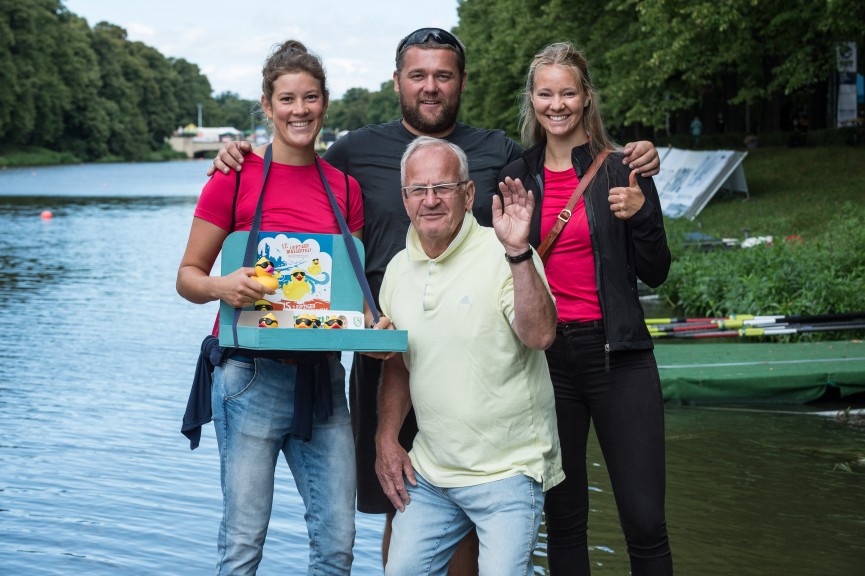
Part of this is the tremendous support from the Leipzig rowing clubs – SC DHfK, Triton and Akademischer Ruderverein – from setup, to officials, to running the Biergarten at the finish line and helping organize the Leipzig (Rubber) Duck Race. They get to benefit from the proceeds as well, so everybody wins.
The surroundings are another ingredient in the magic, of course. Herr Orlowski pointed to the canal and bridges, with all the happy festival goers – so close to the water, they were almost on top of what would become the race course the next day. And then he said: “If someone asked me to build an arena for a sprint rowing competition, this is what it would look like.”
At the rowing races on Saturday, I spoke to competitors and spectators about their impressions, asking them what they’d enjoyed the most. Likewise, all of them said they felt like they were so close to the competition, they could reach out and touch the boats.

This energy at Wasserfest turns into an electric atmosphere for the athletes as well. At the start of the Leipzig course, competitors are flanked on three sides with large crowds in such close proximity, and cheering so loudly, that their hair stands on end. Boris says:
In this sport, you never get an arena-feeling like this.
Where courses are usually wide rivers or lakes, it is rare for athletes in rowing to have the kind of energy footballers do when entering a packed arena. And that is what Leipzig spectators have created for the athletes: a very special feeling that makes the Leipzig event their favorite out of the five competition sites during the season.
The season, starting in May in Frankfurt am Main, has three competition events before the summer break, and resumes in Leipzig before the league final in Berlin.

This makes the competition in Leipzig as critical, if not more so, than the opening in Frankfurt.
Herr Orlowski expained that after the summer break, you always have surprises because some teams go on holiday, while others are able to invest in serious training camps together. Teams toward the bottom of the rankings are able to come back in Leipzig and topple teams at the top of the leaderboard.
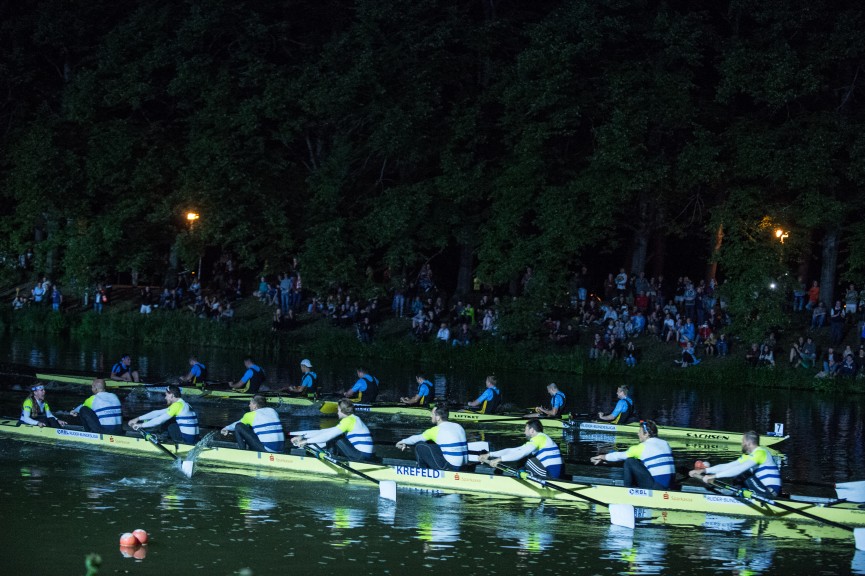
This year was no exception. The surprise of the night in the men’s championships league was a local team from Saxony, the Wurzen Achter. Taking full advantage of the home crowd, they managed to beat out favorites from Frankfurt (Germania) and Berlin (Arkona), to the Grand Final with the reigning champions from Krefeld.
With the Saxon team in the final against the champions of the league, the home crowd going wild, the energy escalated even more than they had during other races. Krefeld won, but Wurzen still took home a respectable second place. The Berlin team finished third, beating out the very strong Germania.
The final races were held after dark, lit up by giant floodlights.
Many of the teams built up the excitement with lights on their own boats, as if thanking their fantastic Leipzig audience for making this such an electric competition. Herr Orlowski said the Leipzig spectators were the most engaged and welcoming of all, and very sports savvy – which is what he expected from a city with such history and successful presence in many sports nationally.

The rowing teams’ bullpens, where they keep their equipment between rounds, were meters away from the food booths and music stage for the Wasserfest at Clara Park. So spectators got direct access to the athletes, able to ask them questions about the sport, their training, and what they were most excited about.
The league itself is excited over some news in the women’s division: According to Herr Orlowski, this is the first year the DRV has invited and given special permission to an Austrian team from Linz to compete, because “Germany is the only one with [a league] like this. Other countries are coming here to ask us how we have organized it, so they can take the idea back to their country to have a sprint league.”
At Wasserfest, the women from Hanau Hassia, one of the high-ranking teams, were eliminated in the quarter finals against Essen-Kettwig, by a mere .03 seconds. One competitor observed: “One week you can lose by .03 seconds, and the next time you can win by .03 seconds. That’s the Bundesliga.” Still, Hanau managed to earn enough points to move from third to second place after Leipzig.
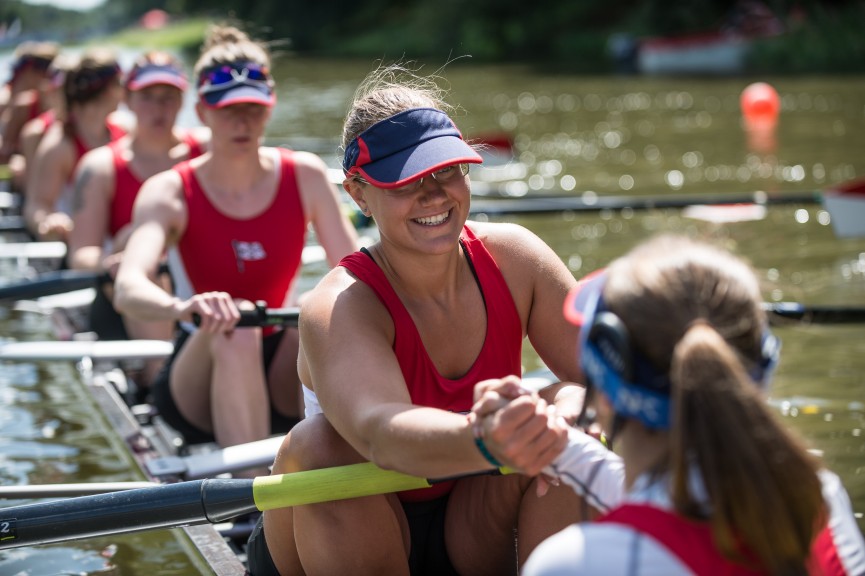
Conversely, the Wurzen team, which traditionally finished toward the back of the pack, was not expected to finish second in Leipzig. This earned them enough points from the previous rankings before the summer break to rise to fifth place. An unpredictable sport, indeed.
It will be exciting to see if these late season upsets accomplished in Leipzig will be enough to carry new teams into the top rankings in the Bundesliga for the final in Berlin. The answer will come on 16 September.
Cover shot: Rowing boat at Wasserfest with fireworks and crowd during Bundesliga competition. (Photo: Alexander Pischke / Ruder-Bundesliga)


